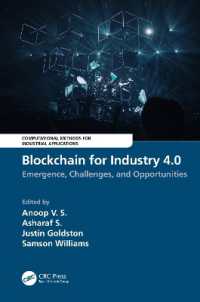Full Description
As our society confronts the impacts of globalization and global systemic risks—such as financial contagion, climate change, and epidemics—what can studies of the past tell us about our present and future? How Worlds Collapse offers case studies of societies that either collapsed or overcame cataclysmic adversity. The authors in this volume find commonalities between past civilizations and our current society, tracing patterns, strategies, and early warning signs that can inform decision-making today. While today's world presents unique challenges, many mechanisms, dynamics, and fundamental challenges to the foundations of civilization have been consistent throughout history—highlighting essential lessons for the future.
Contents
Introduction
Section 1: Theory and Insights of Historical Collapse
1. Globalization and Fragility: A Systems Approach to Collapse
Miguel A. Centeno, Peter W. Callahan, Paul A. Larcey, and Thayer S. Patterson
2. How Scholars Explain Collapse
Joseph A. Tainter
3. Diminishing Returns on Extraction: How Inequality and Extractive Hierarchy Create Fragility
Luke Kemp
4. Collapse, Recovery, and Existential Risk
Haydn Belfield
Section 2: Historical and Archaeological Investigations of Collapse
5. "Mind the Gap": The 1177 BCE Late Bronze Age Collapse and Some Preliminary Thoughts on Its Immediate Aftermath
Eric H. Cline
6. The End of "Peak Empire": The Collapse of the Roman, Han, and Jin Empires
Walter Scheidel
7. Collapse and Non-collapse: The Case of Byzantium ca. 650-800 CE
John Haldon
8. Fluctuat Nec Mergitur: Seven Centuries of Pueblo Crisis and Resilience
Timothy A. Kohler, R. Kyle Bocinsky, and Darcy Bird
9. Episodes of the Feathered Serpent: Aztec Imperialism and Collapse
Deborah L. Nichols and Ryan H. Collins
10. The Black Death: Collapse, Resilience, and Transformation
Samuel K. Cohn, Jr
11. The Cases of Novgorod and Muscovy: Using Systems Thinking to Understand Historical Civilizational Response to Exogenous Threats
Miriam Pollock, Benjamin D. Trump, and Igor Linkov
12. Resilience of the Simple? Lessons from the Blockade of Leningrad
Jeffrey K. Hass
Section 3: Systemic Collapse Insights from Ecology, Climate, and the Environment
13. Climate Change and Tipping Points in Historical Collapse
Timothy M. Lenton
14. Conservation of Fragility and the Collapse of Social Orders
John M. Anderies and Simon A. Levin
15. Resilience and Collapse in Bee Societies and Communities
Christina M. Grozinger and Harland M. Patch
Section 4: Future Systemic Collapse and Quantitative Modeling
16. Producing Collapse: Nuclear Weapons as Preparation to End Civilization
Zia Mian and Benoît Pelopidas
17. From Wild West to Mad Max: Transition in Civilizations
Richard Bookstaber
18. Phase Transitions and the Theory of Early Warning Indicators for Critical Transitions
George I. Hagstrom and Simon A. Levin
19. The Lifespan of Civilizations: Do Societies "Age," or Is Collapse Just Bad Luck?
Anders Sandberg
20. Multipath Forecasting: The Aftermath of the 2020 American Crisis
Peter Turchin








